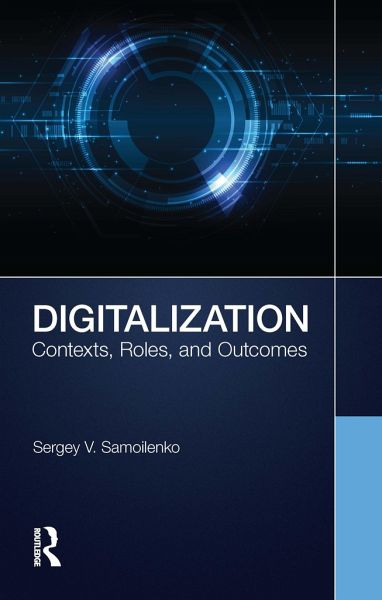
Digitalization
Contexts, Roles, and Outcomes
Versandkostenfrei!
Versandfertig in 6-10 Tagen
112,99 €
inkl. MwSt.
Weitere Ausgaben:

PAYBACK Punkte
56 °P sammeln!
Conceptually, as well as practically, digitalization is similar to the implementation of a modern computation model - the model may be a centralized setup using a mainframe or it may be extended to an N-tier architecture. Regardless of the specifics of the implementation, however, the conceptual model of data processing remains the same. Digitalization is nothing but a system relying on digital technologies to create, conduct and, potentially, expand a business activity of some sort. Digitalization can be used to create an e-commerce model for a small business or to create a global supply and ...
Conceptually, as well as practically, digitalization is similar to the implementation of a modern computation model - the model may be a centralized setup using a mainframe or it may be extended to an N-tier architecture. Regardless of the specifics of the implementation, however, the conceptual model of data processing remains the same. Digitalization is nothing but a system relying on digital technologies to create, conduct and, potentially, expand a business activity of some sort. Digitalization can be used to create an e-commerce model for a small business or to create a global supply and distribution chain geared toward almost any kind of a business. It could also be used for non-profit purposes, such as on-line education and telemedicine or e-government.
Digitalization: Contexts, Roles, and Outcomes is a contemplation and analysis of the socio-technical system that is known as digitalization. It considers the context of digitalization as well as the ways by which digitalization offers value to the context within which it operates. This book aims to offer readers an entry point to a path of inquiry into the different aspects of digitalization. The goal is to identify main directions for further inquiry as well as to outline the most obvious obstacles along the way. The book aims to guide readers on their own unique journeys using the basic ideas, principles, and concepts synthesized, developed, and presented in the book. It is beneficial to both practitioners and researchers.
The book covers:
The functionality of digitalization
The significance of digitalization
Identifying the context of digitalization
Designing a control system
A cognitive model for the theory of digitalization
Designing a theory of digitalization
The book helps readers to consider the subject of digitalization in a rigorous and rationalway so their own perspectives can emerge stronger and be substantiated and reinforced by building an argument vis-à-vis perspectives and points examined in this book.
Digitalization: Contexts, Roles, and Outcomes is a contemplation and analysis of the socio-technical system that is known as digitalization. It considers the context of digitalization as well as the ways by which digitalization offers value to the context within which it operates. This book aims to offer readers an entry point to a path of inquiry into the different aspects of digitalization. The goal is to identify main directions for further inquiry as well as to outline the most obvious obstacles along the way. The book aims to guide readers on their own unique journeys using the basic ideas, principles, and concepts synthesized, developed, and presented in the book. It is beneficial to both practitioners and researchers.
The book covers:
The functionality of digitalization
The significance of digitalization
Identifying the context of digitalization
Designing a control system
A cognitive model for the theory of digitalization
Designing a theory of digitalization
The book helps readers to consider the subject of digitalization in a rigorous and rationalway so their own perspectives can emerge stronger and be substantiated and reinforced by building an argument vis-à-vis perspectives and points examined in this book.













